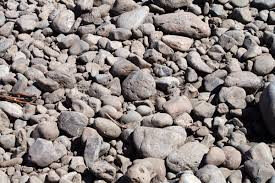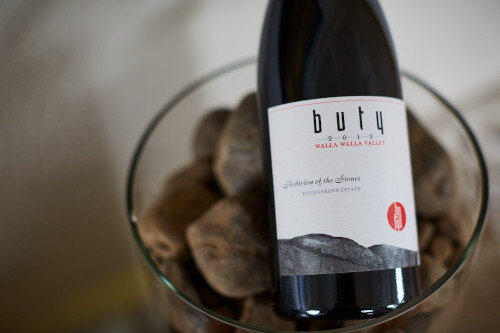Buty Winery - Rocking It
I'm jealous of Nina Buty (pronounced "beauty") - the founder of Buty Winery - for several reasons. Her "Rockgarden" estate vineyard is ten prime acres of organically farmed vineyard in one of the most unique AVA's in the U.S., if not the world - The Rocks district of Milton-Freewater. She turned a liberal arts degree into a successful career of creating delicious wines. Also, she lives in a place where it snows in winter.
But it's the story of her wine that interests me.

Story is such a buzz word these days. In marketing and sales - we are asked to tell the story of our brand, our business. We are told that to be successful we must have a good story.
In the context of wanting to sell - whether we are selling wine or anything else - we may have lost sight, though, of what Nina Buty calls the "primal need" of story. We may tell our story, Buty says, but it takes on a life outside of us and beyond us.
Stories are encapsulated miniature life-cycles. Something is born, it struggles, it triumphs or fails (maybe more than once), and it dies. Again and again we repeat this cycle - in pictures, in words, in wine - like a chant, like a lifelong mantra.
A story is a mirror with a warning that "things are closer than they appear." It's a reminder, a way to experience a condensed form of the very thing from which it arises. It helps us cope with - by laughing at, crying at, and seeing the beauty in - the inescapable.
For Nina Buty, wine is a story unto itself. It tells its own story.
If you read around the Buty Winery website a bit, you'll see the word "Interconnection" in one form or another more than once. This word is at the heart of the Buty story, and why I'm such a fan of Buty - beyond, of course, my covetous nature.
She sees the potential for a bottle of wine to make a connection between the land and the people who work it and the people who, far away from that land, taste its story in the bottle.
Nina Buty has built Buty Winery with this intention. She makes her wines to reflect the "weaving of things" - a mystical, but not at all far-fetched, conception of the interconnection of all things. That is why, she asserts, you can taste what she calls a "family resemblance" in all of the Buty wines.
"Places of nexus - of not just touch, but overlap - have always been fascinating to me," Buty explains. "The winery is one of those places."
Buty Winery is located, appropriately, in Walla Walla - a unique AVA that overlaps two states: south-east Washington and north-east Oregon. Climatically, Walla Walla is also unique - it is the furthest north occurrence on the planet of a hot-summer Mediterranean climate.
This climate leads to a place, and wines, of extremes. Summer temperatures are often above 100 degrees F, but the biggest challenge in the vineyard is actually winter-kill and bud damage from cold freezes. When everything aligns, the resulting wines can be lush and ripe while also elegant, complex, and age-worthy.
While the Buty tasting room and winery are located in the town of Walla Walla in Washington, and most of the vineyards from which Buty sources its grapes are the "grand crus" of Washington, Buty's Rockgarden estate vineyard is in Oregon in a unique sub-appelation of the Walla Walla Valley AVA called "The Rocks District of Milton-Freewater."
Where so many AVAs can be so large as to be meaningless, or determined loosely by non-unique or non-distinctive collectives of terroir, The Rocks is one place in the U.S. that is absolutely geologically unique. Buty describes The Rocks as a riverbed six miles square with cobblestones up to 500 feet deep. The cobblestones are the remains of an ancient alluvial fan created by the Walla Walla river, and range in size from small russet potatoes to footballs. If this brings to mind the galets of Chateauneuf-du-Pape, you've made the connection to the most common comparison The Rocks gets. Just add more rocks.
This kind geology leads to mineral rich, extremely well drained "soils" that cause the vines to root deeply and the wines to taste distinctively. The basalt cobblestones that line the vineyard rows absorb and radiate the sun's energy as well as reflect it up into the vines, allowing for earlier budding and greater ripening.
Buty saved and planned for years to be able to purchase 10 acres in the highest and most prime section of The Rocks to establish her Rockgarden estate vineyard. "We planted the vines with a crowbar," Buty reminisces.

Washington state has the lowest percentage of organically or biodynamically farmed vineyards of any western state, but Buty chose to farm organically from the beginning. It was precious land to her, and she saw Buty winery as its steward. "It was where my children were going to play, and where we were going to employ people to work."
That personal connection to the land, and interconnection between it and all of our lives, is a common reason vineyard owners give for choosing to farm organically. Though Rockgarden continues to be farmed organically, Buty only got the vineyard certified from 2010-15. The knowledge that she was farming responsibly and cleanly was more important than the piece of paper she could use for marketing purposes.
It's not cheap to farm the Rockgarden. The stones wreak havoc on equipment. Suspensions are soon shot. It is a physically strenuous vineyard to farm. The money she saved by not getting certified each year Buty put back into the vineyard.
When I pushed Nina Buty to talk about why she thought more vineyards in Washington state weren't organic or biodynamic, she gave one of the most thoughtful excuses I've ever heard, and one that will definitely be the sole subject of an entire future post:
How we farm is always evolving, she said. We are changing and adapting to new knowledge, new climatic events, and new pest pressures. It's not static. But committing to organic viticulture feels like locking into only one option. There's a fear of doing the same kind of viticulture year after year, despite annual variations.
If I'm a typical winery owner, Buty speculated, I feel that organic viticulture ties my hands, and it costs more. If I choose to farm organically, I'll limit the tools I have to keep the vineyards healthy and, ultimately, sustainable. If there isn't a market demand or reward for it, then what's the incentive?
Of course I think there are answers to these arguments (and I'm trying to promote that market demand), and Buty likely does too since she chose to farm her estate vineyard organically. But she displays such an empathy for and camaraderie with her Walla Walla wine community that she gives full credit to those who choose to farm differently.
"Camaraderie" is the word Buty uses to describe Walla Walla, actually. It's not shellacked, she says. It's pretty real. There's a high level of wine knowledge and a small population. That leads to great access. Winery owners can often be found pouring their own wines in their tasting rooms.
"There's no traffic and lots of parking," she adds with chuckle, knowing how to tease a Los Angeleno. Oh, and there are something like two distilleries, four breweries, and 20 wineries within four blocks of the Walla Walla airport.
Is Walla Walla sounding like booze heaven to anyone else?

As a footnote to this article, a week after my initial phone interview with Nina Buty I read in the wine trades that she had sold the Rockgarden estate vineyard. Buty Winery will continue as it has, and the new owners have said that they intend to continue to farm Rockgarden organically. Buty made the choice to sell for many reasons, mainly that it was the right opportunity at the right time for her family.
Please use this form to join our mailing list if you want to support positive change in wine and the world, as well as be the first to get access to our new wine releases and special offers.